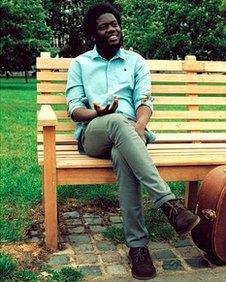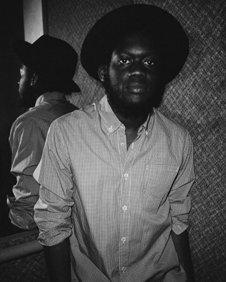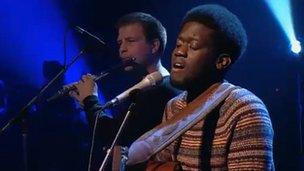Sound of 2012: Michael Kiwanuka
- Published
Michael Kiwanuka takes a trip back to the store where he bought his first guitar
Soulful singer Michael Kiwanuka has come top of the BBC's Sound Of 2012 list.
The list, compiled using tips from more than 180 tastemakers - made up of music critics, editors, broadcasters and bloggers - aims to highlight some of the most exciting emerging artists.
Backstage at Jools Holland's BBC Two show, there is a lot of stress.
Young singer-songwriter Michael Kiwanuka has landed the sought-after "new artist" slot. It's his first television appearance, and he will have to hold his own beside Bjork, Noel Gallagher and the Red Hot Chili Peppers.
Adding to his nerves, the 24-year-old is playing I'm Getting Ready, a song he has never performed live before.
Kiwanuka's press officer, meanwhile, has problems of her own.
"We need to make sure Jools gets his name right," she mutters. "Can we send a note to his dressing room?"
Kiwanuka doesn't hear about the pronunciation panic until he's finished his soundcheck - but he finds it hilarious.
"I get called all sorts of things," he laughs. "Michael Kiwa-nin-nin-nooko, Michael Keena-wooka, Michael Kawaski.
"Anything other than Michael Kiwanuka."
For the record, his surname is pronounced Key-wa-noo-ka. It's an African name that means "God of lightning and thunder", and it's hard to imagine a description that would suit him less.
Affable and quietly spoken, Kiwanuka was born to Ugandan parents and raised in London's Muswell Hill.

The singer says he draws inspiration from Bob Dylan and Bill Withers
People who have stumbled across his first two EPs will already know what to expect.
Kiwanuka is blessed with a voice so soulful and mature it appears to have been beamed in directly from Memphis in 1972.
When his flute-embellished single Tell Me A Tale was playlisted by BBC 6 Music last summer, some listeners were convinced the station had uncovered a long-lost Al Green record.
"I love that sound," beams Kiwanuka. "So that's a great honour.
"The singers I listen to are quite old-school and I think that era is really cool. The way the chords sounded, and the feeling of the playing is very loose.
"There's a jazz feel compared to a lot of modern music, which is very straight."
Kiwanuka grew up in a largely music-free environment, after his parents' record player broke when he was a toddler. Instead, he credits schoolfriends for his musical education.
"They'd have a band name on the back of their bag at school. So I'd be like, 'who are the Red Hot Chili Peppers?' and then I'd save up seven weeks pocket money to buy one CD."
Free from tribal allegiances, he flitted between genres almost at random.
His favourite albums included Nirvana's live recording From The Muddy Banks Of The Wishkah, D'Angelo's sultry R&B platter Voodoo and a free disc from a magazine, containing a formative take of Otis Redding's Sitting On The Dock Of The Bay.
By the time he was 16, Kiwanuka had picked up a guitar and started composing his own songs.
But as anyone who has ever owned a tape recorder will know, hearing your own voice for the first time can be a shock.
"The first few times I sang in the studio it wasn't great," he says.
"I wanted to sound like other people so much, because I liked the sound of their voice through the speakers.
"You always imagine having your hero's voice, so at first I tried to change it and sang in styles that didn't really suit me."
Settling on a sound was something of a struggle for the musician.
Kiwanuka studied jazz and worked as a session musician before finally deciding to go solo.
"I felt I wasn't going to continue playing music if I kept being moulded in a way that wasn't me," he says.

The singer says he hopes the craft of songwriting is making a comeback
He spotted a MySpace advert for songwriters and sent off a couple of his demos. Almost instantly, a reply arrived, asking Kiwanuka to consider recording them himself.
Those early recordings were still available on MySpace relatively recently. They showcase a folky, stripped-back aesthetic that has blossomed into a more fulsome soul sound on the finished recordings.
Kiwanuka puts that down to Paul Butler of indie band The Bees, who produced the album in his home studio on the Isle Of Wight.
"He saw music from the sonic, rhythmic side of things, where I saw it through just the song and the guitar part," says Kiwanuka. "It was exciting - a new sound that I hadn't quite thought I could do."
The recordings have a vintage warmth to them. Analogue tape distortion and valve amplifiers add a hazy 1970s sheen, as if the MP3s have dust trapped between their ones and zeroes.
"The mixing desk we used was an old 1960s Swedish broadcast desk," Kiwanuka recalls.
"I guess the sound is down to the circuitry and the way they were made. Eroded elements add character and warmth."
With his retro sound come spiritual lyrics: "Lord, I'm getting ready to believe," he sings on I'm Getting Ready. "We'll be waving hands, singing freely. Singing, standing tall, it's coming easy."
It may sound like Kiwanuka is a man out of place and time, but he believes there's a fresh appetite for expertly crafted songs, played live by actual human beings.
"There's nothing more exciting to me than using real instruments in the studio," he says.

Kiwanuka made his first TV appearance live on Jools Holland's BBC Two show
"The instruments Adele or Florence [Welch] are using have been around for decades but their records still sound fresh to me. So that must be the best way to record music."
In fact, Kiwanuka toured with Adele earlier this year, an experience he describes as a "a great test".
"Going on before someone who sings as well as she does gives you a kick up the backside," he says.
"It's like being a footballer who gets the chance to go on at half-time in the Premiership. You see if you can last those 45 minutes and, if it goes well, you get to play the full game next time.
"So hopefully next year people will be up for coming to see me do a full show."
As he takes to the stage for his TV performance, it looks like all those practice matches have paid off.
Kiwanuka's subtle, assured performance is a tender moment of humanity in the midst of Bjork's chirruping and the scrappy bombast of the Chili Peppers.
And, to cap it all, Jools gets his name right.
- Published6 January 2012
- Published5 January 2012
- Published4 January 2012
- Published3 January 2012
- Published1 January 2012